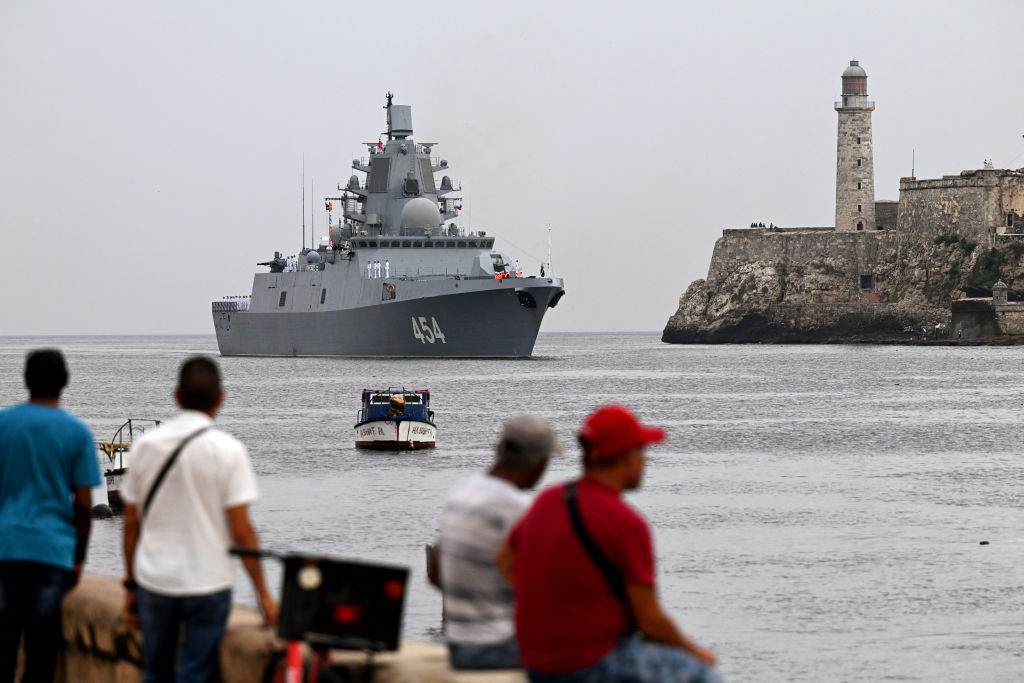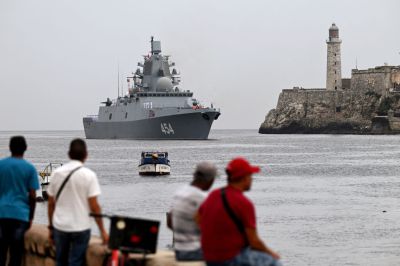In October 1962, Cold War tensions between the U.S. and Soviet Union crested during a perilous 13-day standoff after Soviet nuclear missiles were deployed to the island of Cuba. Dozens of social media posts this week floated the idea that the U.S. might be approaching a repeat of the crisis.
“BREAKING: Possible ‘Cuban Missile Crisis 2.0’ developing,” one Facebook post read. “Cuban Missile Crisis 2.0?” asked Fox News Radio in another.
Earlier this week, Russian ships were spotted off the coast of Florida, leading to claims that U.S. and Canadian naval forces were engaged in a standoff with the vessels.
“BREAKING: Russian warships clash with US, Canadian ships near Florida Keys. In an unexpected and tense development, Russian warships have sailed into the Atlantic and are currently involved in a standoff with American and Canadian ships near Key Largo, Florida,” reads one X (formerly Twitter) post with more than 29,000 views.
These posts are misleading. Russian military ships are operating in the Atlantic and Caribbean, but they pose no direct threat to the U.S. The vessels are in Cuba, less than 250 miles from Miami, for planned military exercises. No clashes or standoffs are occurring.
On Wednesday morning, Cuba was set to welcome four Russian naval vessels—a frigate, an oil tanker, a salvage tug, and a nuclear submarine—into its territorial waters ahead of air and naval exercises taking place later this month. The two nations are longtime allies. The Russian ships sailed within 30 miles of southern Florida, according to U.S. officials, but military officials characterized the drills as typical. “Russia’s deployments are part of routine naval activity which pose no direct threat or concern to the United States,” a U.S. Northern Command spokesperson told The Dispatch Fact Check in an emailed statement.
Three U.S. Navy destroyers, along with submarine reconnaissance aircraft, were tasked to shadow the Russian vessels during their approach to the Caribbean. “In accordance with standard procedures, we’ve been actively monitoring the Russian ships as they transited the Atlantic Ocean within international waters,” the statement said. “Air and maritime assets under U.S. Northern Command have conducted operations to ensure the defense of the United States and Canada.”
U.S. naval vessels responded similarly in 2023 when Chinese and Russian vessels were detected off the coast of Alaska. In that instance, four U.S. Navy destroyers and a P-8 Poseidon aircraft were deployed to shadow the patrolling ships.
Relations between the U.S. and Russia have become increasingly strained since Russian forces invaded Ukraine in February 2022. The U.S. has provided Ukraine with more than $100 billion in aid in support of its war effort, and earlier this week expanded sanctions aimed at Russia’s technological links with China.
If you have a claim you would like to see us fact check, please send us an email at factcheck@thedispatch.com. If you would like to suggest a correction to this piece or any other Dispatch article, please email corrections@thedispatch.com.







Please note that we at The Dispatch hold ourselves, our work, and our commenters to a higher standard than other places on the internet. We welcome comments that foster genuine debate or discussion—including comments critical of us or our work—but responses that include ad hominem attacks on fellow Dispatch members or are intended to stoke fear and anger may be moderated.
With your membership, you only have the ability to comment on The Morning Dispatch articles. Consider upgrading to join the conversation everywhere.